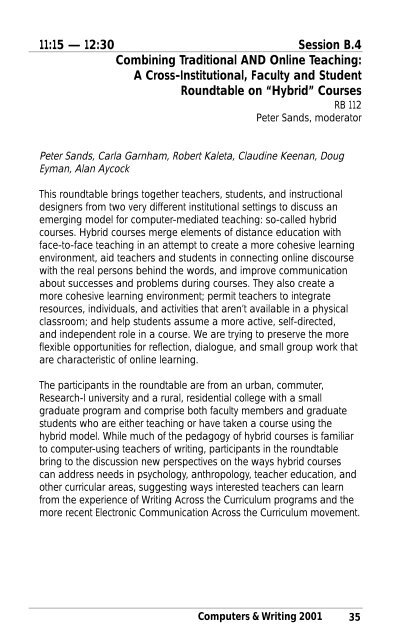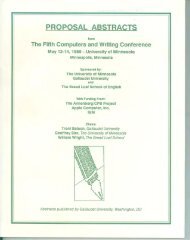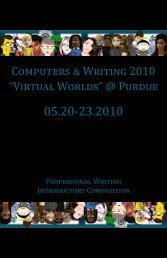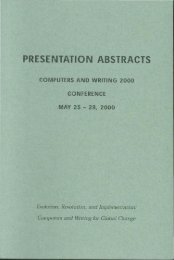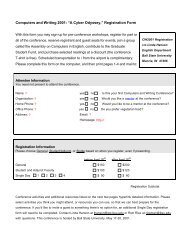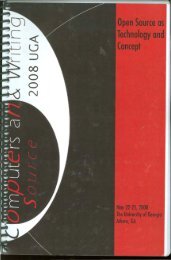CW2001 Program - Computers and Writing
CW2001 Program - Computers and Writing
CW2001 Program - Computers and Writing
You also want an ePaper? Increase the reach of your titles
YUMPU automatically turns print PDFs into web optimized ePapers that Google loves.
11:15 — 12:30 Session B.4<br />
Combining Traditional AND Online Teaching:<br />
A Cross-Institutional, Faculty <strong>and</strong> Student<br />
Roundtable on “Hybrid” Courses<br />
RB 112<br />
Peter S<strong>and</strong>s, moderator<br />
Peter S<strong>and</strong>s, Carla Garnham, Robert Kaleta, Claudine Keenan, Doug<br />
Eyman, Alan Aycock<br />
This roundtable brings together teachers, students, <strong>and</strong> instructional<br />
designers from two very different institutional settings to discuss an<br />
emerging model for computer-mediated teaching: so-called hybrid<br />
courses. Hybrid courses merge elements of distance education with<br />
face-to-face teaching in an attempt to create a more cohesive learning<br />
environment, aid teachers <strong>and</strong> students in connecting online discourse<br />
with the real persons behind the words, <strong>and</strong> improve communication<br />
about successes <strong>and</strong> problems during courses. They also create a<br />
more cohesive learning environment; permit teachers to integrate<br />
resources, individuals, <strong>and</strong> activities that aren’t available in a physical<br />
classroom; <strong>and</strong> help students assume a more active, self-directed,<br />
<strong>and</strong> independent role in a course. We are trying to preserve the more<br />
flexible opportunities for reflection, dialogue, <strong>and</strong> small group work that<br />
are characteristic of online learning.<br />
The participants in the roundtable are from an urban, commuter,<br />
Research-I university <strong>and</strong> a rural, residential college with a small<br />
graduate program <strong>and</strong> comprise both faculty members <strong>and</strong> graduate<br />
students who are either teaching or have taken a course using the<br />
hybrid model. While much of the pedagogy of hybrid courses is familiar<br />
to computer-using teachers of writing, participants in the roundtable<br />
bring to the discussion new perspectives on the ways hybrid courses<br />
can address needs in psychology, anthropology, teacher education, <strong>and</strong><br />
other curricular areas, suggesting ways interested teachers can learn<br />
from the experience of <strong>Writing</strong> Across the Curriculum programs <strong>and</strong> the<br />
more recent Electronic Communication Across the Curriculum movement.<br />
<strong>Computers</strong> & <strong>Writing</strong> 2001<br />
35


